Talk #4: Discernment of Spirits
Below is the outline for Talk 4, titled “Discernment of Spirits.” As you listen to the teaching video, follow along in this outline. You may print this outline and use the space to the right for notes or use your own journal for notetaking.
This teaching video covers the first four (of the fourteen) Rules of Discernment given by St. Ignatius. The text of the first four rules is provided at the end of this talk outline for a single reference.
Discussion questions follow the reference materials at the end of this outline. If you are participating in this series together with a group, consider selecting some or all of these questions for your group discussion.
Talk Outline
- One of the keys to learning to follow the movements of God is the Discernment of Spirits
-
- Movements in my soul come from 3 places: God, the enemy, or myself (my human spirit).
- St. Ignatius defines the enemy broadly as anything that is not from God. This includes the fallen angels (including the devil). This also includes the fallen part of ourselves, such as tendencies in our own psyche which spring from egoism or disordered sensuality. Scriptures calls this the world, the flesh, and the devil.
- St. Ignatius calls God, the blessed Trinity, the good spirit. He also means the way God acts on us by the good spirits, that part of us which is in league with God by the sanctifying grace from our baptism, and the Church, the body of Christ who influences us toward the good.
- St. Ignatius names these movements consolations or desolations.
- We all experience ups and downs in our spiritual life – times when we have great energy, God feels close and we desire to pray and serve, and other times when we don’t have energy, God feels far away and we find it difficult to pray.
- St. Ignatius teaches us discernment of spirits to help us understand these ups and downs so that we can navigate our life and follow God more easily.
- St. Ignatius learned this in his conversion. During recovery from an injury in battle, he read the life of Christ and lives of the saints.
- When thinking about things of the world he took delight in them, but afterwards was dry and discontented.
- When thinking about living as the saints he was consoled, and afterwards he remained content and happy.
- One time “his eyes were opened a little,” realizing from experience that some thoughts left him sad and others happy.
- Little by little he came to recognize the difference between the spirits – one from the enemy, and the other from God.
- St. Ignatius wrote his rules for discernment of spirits – how to know when the enemy is bothering me and how to know when God is leading me.
- Movements in my soul come from 3 places: God, the enemy, or myself (my human spirit).
- Discernment of Spirits: Introduction to the Rules
-
- “Rules for becoming aware and understanding to some extent the different movements which are caused in the soul, the good to receive them, and the bad to reject them.” (313)
- St. Ignatius wants to help us do 3 things:
- To become aware (“his eyes were opened a little”).
- To understand (try to figure out where these movements are coming from and what they mean).
- To respond (accept the good, reject the bad).
- To become aware of spiritual movements in the soul.
- St Augustine says, “You were within, and I was without. And created things kept me from you.” (Confessions, Book 10.) In our world today, it’s easy to live habitually without.
- Need silence and time in prayer to hear the voice of God in my heart.
- St. Ignatius gives fourteen rules for discernment. This teaching will discuss rules one through four.
- First Rule: Persons moving away from God
- “First Rule. The first rule: in persons who are going from mortal sin to mortal sin, the enemy is ordinarily accustomed to propose apparent pleasures to them, leading them to imagine sensual delights and pleasures in order to hold them more and make them grow in their vices and sins. In these persons the good spirit uses a contrary method, stinging and biting their consciences through their rational power of moral judgment.” (314)
- Notice the directional quality of these rules. Our life is headed in a general direction at all times – toward God or away from God.
- The first rule applies to persons heading away from God (“going from mortal sin to mortal sin”).
- The enemy works on the level of desires (“propose apparent pleasures to them”).
- God works on the rational level, the head (“stinging and biting their consciences”).
- God and the enemy always work contrary to each other.
- Second Rule: Persons moving away from God
-
- “Second Rule. The second: in persons who are going on intensely purifying their sins and rising from good to better in the service of God our Lord, the method is contrary to that in the first rule. For then it is proper to the evil spirit to bite, sadden, and place obstacles, disquieting with false reasons, so that the person may not go forward. And it is proper to the good spirit to give courage and strength, consolations, tears, inspirations and quiet, easing and taking away all obstacles, so that the person may go forward in doing good.”
- (315)The second rule applies to persons heading toward God (“rising from good to better in the service of God”).
- God and the enemy work contrary to each other.
- This time, the enemy works at the rational level, the head (“bite, sadden, and place obstacles, disquieting with false reasons”).
- God works at the level of heart to make it easy to go forward (“courage and strength, consolations”).
- Example from St. Augustine’s Confessions Book 10.
-
- Headed away from God.
- “I was in torment, reproaching myself more bitterly than ever as I twisted and turned in my chain. I hoped that my chain might be broken once and for all, because it was only a small thing now… And you, O Lord, never ceased to watch over my secret heart. In your stern mercy you lashed me with the twin scourge of fear and shame …”
- St. Augustine is headed away from God, still attached to his sin. He wants to be free but isn’t able. God lashed him “with the twin scourge of fear and shame.” That was God’s mercy.
- He beings to make a turn toward God. As he turns God begins to console him.
- Headed toward God.
- “But by now … I had turned my eyes elsewhere, and while I stood there trembling at the barrier, on the other side I could see the chaste beauty of Continence in all her serene, unsullied joy, as she modestly beckoned me to cross over and to hesitate now more.”
- When St. Augustine turned toward God in prayer, God gives him an interior vision of hope to help him and to allow him to surrender. In his vision, lady Continence gives him courage. Right after this is the famous passage – Take and Read!
- Headed away from God.
- Third Rule: Spiritual Consolation
-
- For persons headed toward God, God works through spiritual consolation (uplifting movement of the heart).
- “Third Rule. The third is of spiritual consolation. I call it consolation when some interior movement is caused in the soul, through which the soul comes to be inflamed with love of its Creator and Lord, and, consequently when it can love no created thing on the face of the earth in itself, but only in the Creator of them all. Likewise when it sheds tears that move to love of its Lord, whether out of sorrow for one’s sins, or for the passion of Christ our Lord, or because of other things directly ordered to his service and praise. Finally, I call consolation every increase of hope, faith and charity and all interior joy that calls and attracts to heavenly things and to the salvation of one’s soul, quieting it and giving it peace in its Creator and Lord.” (316)
- Spiritual consolation always comes from God. An uplifting movement of various kinds that moves me towards God and helps me to follow him in life.
Notice the words and how they are all affective words. These uplifting movements come in various degrees and intensity. - Example from St. Thérèse of Lisieux.
- Seeing the hen protecting her little chicks under her wings (nonspiritual consolation) lead her to recall scripture and recognize God’s tenderness and protection of her (spiritual consolation).
- Nonspiritual consolation can lead to spiritual consolation. Likewise, nonspiritual desolation can lead to spiritual desolation.
- Fourth Rule: Spiritual Desolation
-
- For persons headed toward God, the enemy works by trying to slow them down and prevent them from going forward by spiritual desolation.
- “Fourth Rule. The fourth is of spiritual desolation. I call desolation all the contrary of the third rule, such as darkness of soul, disturbance in it, movement to low and earthly things, disquiet from various agitations and temptations, moving to lack of confidence, without hope, without love, finding oneself totally slothful, tepid, sad and, as if separately from one’s Creator and Lord. For just as consolation is contrary to desolation, in the same way the thoughts that come from consolation are contrary to the thoughts that come from desolation.”
- Desolation is the exact opposite of the movement of consolation. Desolation is the work of the enemy
- We all experience spiritual desolation at times. If it goes unchecked, it can be a great obstacle in our spiritual lives.
- Distinguish spiritual desolation (a movement from the enemy) from psychological depression (non-spiritual, second level of the heart). Distinguish between spiritual and non-spiritual consolation and desolation.
- Spiritual desolation is a heavy movement of the heart that leads to low and earthly things.
- Spiritual desolation often presents itself as our spiritual identity. It may take over the past and future. I may forget I ever had a relationship with God and may think I may never be able to again, because God feels so far away. Spiritual desolation uses universal negatives (e.g., “entirely forgotten,” “never will be able to.”). But the enemy is a liar.
- St. Ignatius teaches when you recognize this is spiritual desolation and name it, then you can reject it and come to be free of it.
- Rules one through four define the terms spiritual consolation and desolation.
- Rules five through nine teach what to do in spiritual desolation.
- Rules ten and eleven are about times of spiritual consolation and desolation.
- Rules twelve through fourteen are about what to do in temptation.
- It is worth studying all of them. This basic introduction of rules one through four can help to discern which movements are from God (which is to be accepted), and which are from the enemy (which are to be rejected).
- St. Ignatius letter to Sr. Teresa Rejadell
-
- See full text of quote at the end of this outline.
- Spiritual consolation, when present, allows us to go through our trials, even with joy.
- Spiritual desolation is a normal part of the spiritual life. We all have ups and downs. Need to learn to discern and become aware of what is going on – to recognize desolation is the work of the enemy, and then take appropriate responses to reject it and return to God’s grace and help.
- Two rules (briefly summarized) to do in times of spiritual desolation
-
- When in spiritual desolation, never change your spiritual proposals (Fifth Rule). For example, a proposal to take time for daily prayer or Mass or to go confession. They will be the guide to get through the difficulties.
- When in spiritual desolation or temptation, it is helpful to tell the right person – for example, a good spiritual friend who knows the spiritual life (Thirteenth Rule).
Talk 4: The Text of the First through Forth Rules
Rules for becoming aware and understanding to some extent the different movements which are caused in the soul, the good, to receive them, and the bad to reject them. And these rules are more proper to the first week.
- First Rule. The first rule: in persons who are going from mortal sin to mortal sin, the enemy is ordinarily accustomed to propose apparent pleasures to them, leading them to imaging sensual delights and pleasure in order to hold them more and make them grow in their vices and sins. In these persons the good spirit uses a contrary method, stinging and biting their consciences through their rational power of moral judgment.
- Second Rule. The second: in persons who are going on intensely purifying their sins and rising from good to better in the service of God our Lord, the method is contrary to that in the first rule. For then it is proper to the evil spirit to bit, sadden, and place obstacles, disquieting with false reasons, so that the person may not go forward. And it is proper to the good spirit to give courage and strength, consolations, tears, inspirations, and quiet, easing and taking away all obstacles, so that the person may go forward in doing good.
- Third Rule. The third is of spiritual consolation. I call it consolation when some interior movement is caused in the soul, though which the soul comes to be inflamed with love of its Creator and Lord, and, consequently when it can love no created thing on the face of the earth in itself, but only in the Creator of them all. Likewise when it sheds tears that move to love of its Lord, whether out of sorrow for one’s sins, or for the passion of Christ our Lord, or because of other things directly ordered to his service and praise. Finally, I call consolation every increase of hope, faith, and charity, and all interior joy that calls and attracts to heavenly things and to the salvation of one’s soul, quieting it and giving it peace in its Creator and Lord.
- Forth Rule. The fourth is of spiritual desolation. I call it desolation all the contrary to the third rule, such as darkness of soul, disturbance in it, movement to low and earthly things, disquiet from various agitations and temptations, moving to lack of confidence, without hope, without love, finding oneself totally slothful, tepid, sad and, as if separated from one’s Creator and Lord. For just as consolation is contrary to desolation, in the same way the thoughts that come from consolation are contrary to the thoughts that come from desolation.
Talk 4: Quotations from the letter of St. Ignatius to Sr. Teresa Rejadell
- “I will call your attention briefly to two lessons which our Lord usually gives, or permits. The one of them he gives, the other he permits. The first is an interior consolation which casts out all uneasiness and draws one to a complete love of our Lord …. In a word, when this divine consolation is present all trials are pleasant and all weariness rest. He who goes forward with this fervor, warmth, and interior consolation finds every burden light and sweetness in every penance or trail, however great. This consolation points out and opens the way we are to follow and points out the way we are to avoid. It does not remain with us always, but it will always accompany us on the way at the times that God designates. All this is for our progress.”
- “But when this consolation is absent the other lesson comes to light. Our ancient enemy sets up all possible obstacles to turn us aside from the way on which we have entered. He makes use of everything to vex us, and everything in the first lesson is reversed. We find ourselves sad without knowing why. We cannot pray with devotion, nor contemplate, nor even speak or hear of the things of God with any interior taste or relish. Not only this, but if he sees that we are weak and much humbled by these harmful thoughts, he goes on to suggest that we are entirely forgotten by God our Lord, and leads us to think that we are quite separated from him and that all that we have done and all that we desire to do is entirely worthless. He thus endeavors to bring us to a state of general discouragement…. For this reason it is necessary for us to become aware of our opponent.”



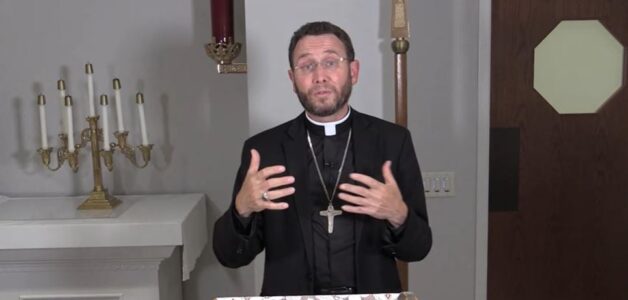




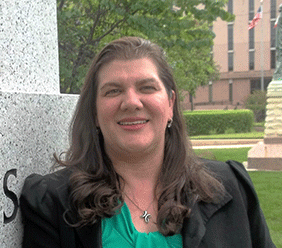

 Kimberly Kay Cox
Kimberly Kay Cox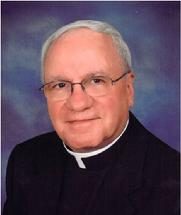







 Mark Mogilka
Mark Mogilka




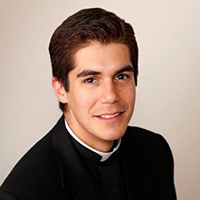









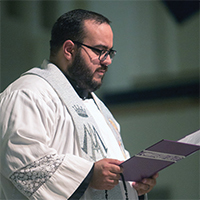
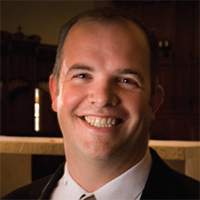


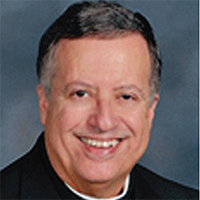

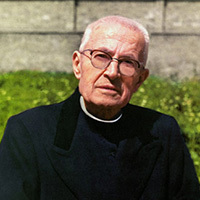








 Armando Cervantes
Armando Cervantes Anna Betancourt
Anna Betancourt
 Andrea Chavez-Kopp
Andrea Chavez-Kopp